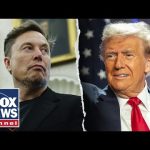In a significant diplomatic event today, President Trump welcomed German Chancellor Frederick Mers to the White House to discuss several pressing matters, including the ongoing conflict in Ukraine. This meeting marked a fresh start for the two leaders, who were about to engage in a most intriguing conversation, particularly considering that they had no prior personal history.
The Oval Office meeting was set to begin at 11:30 a.m., and there was much anticipation about the topics that would be brought to the table. Analysts speculated that Chancellor Mers would attempt to persuade President Trump against increasing tariffs on European goods next month. Given the current tensions with Russia, the new chancellor also aimed to reinforce the importance of treaties designed to protect Europe, including NATO commitments. With a backdrop of global uncertainty, both leaders walked into the meeting with high stakes that could affect relations between their nations and the overall stability in Europe.
Just a day earlier, President Trump had spent a lengthy conversation on the phone with Russian President Vladimir Putin, who warned of impending retaliatory actions. This conversation hinted at the complexities facing global leaders as they navigate not just their relationships with one another, but also the evolving threats posed by adversarial nations. With Putin knowing that he has to respond to recent events, one could expect the dialogue between Trump and Mers to address strategies that might foster peace—or exacerbate tensions.
Interestingly, Trump’s history with German leadership wasn’t all roses. Previous interactions with former Chancellor Angela Merkel had set a precedent that might influence today’s discussions. Trump had some well-known opinions on how Germany has handled various issues in the past, and this might lead to a candid conversation where nothing was off the table. Could Mers reassure Trump that Germany would increase its defense spending to the required 2% of GDP? Or would he see it as an opportunity to advocate for further support to Ukraine? The chatter around the White House hinted that potential agreements were within reach, but nothing was guaranteed.
While eyes were on the Oval Office, other events unfolded across the Atlantic. Defense Secretary Pete Hegseth was holding discussions in Brussels amidst some discontent from allied leaders about a missed meeting concerning aid to Ukraine. The fact that elements of Europe were reconsidering their military stances shows just how fluid the situations have become. As talks continued to swirl around armament support to Ukraine, the stakes only soared higher, signifying that both diplomacy and military readiness would be vital in approaching this global crisis.
Ultimately, the meeting between Trump and Mers had the potential to alter the course of U.S.-European relations, especially concerning hardware support to Ukraine and China’s growing influence. It was an exceptional crossroads of politics, where a good mix of strategy and charisma could lay the groundwork for future successes. Whether this diplomatic dance would end in fruitful advances or the opening of old wounds was yet to be seen, but one thing was certain: both leaders had a chance to make their marks on history today.




